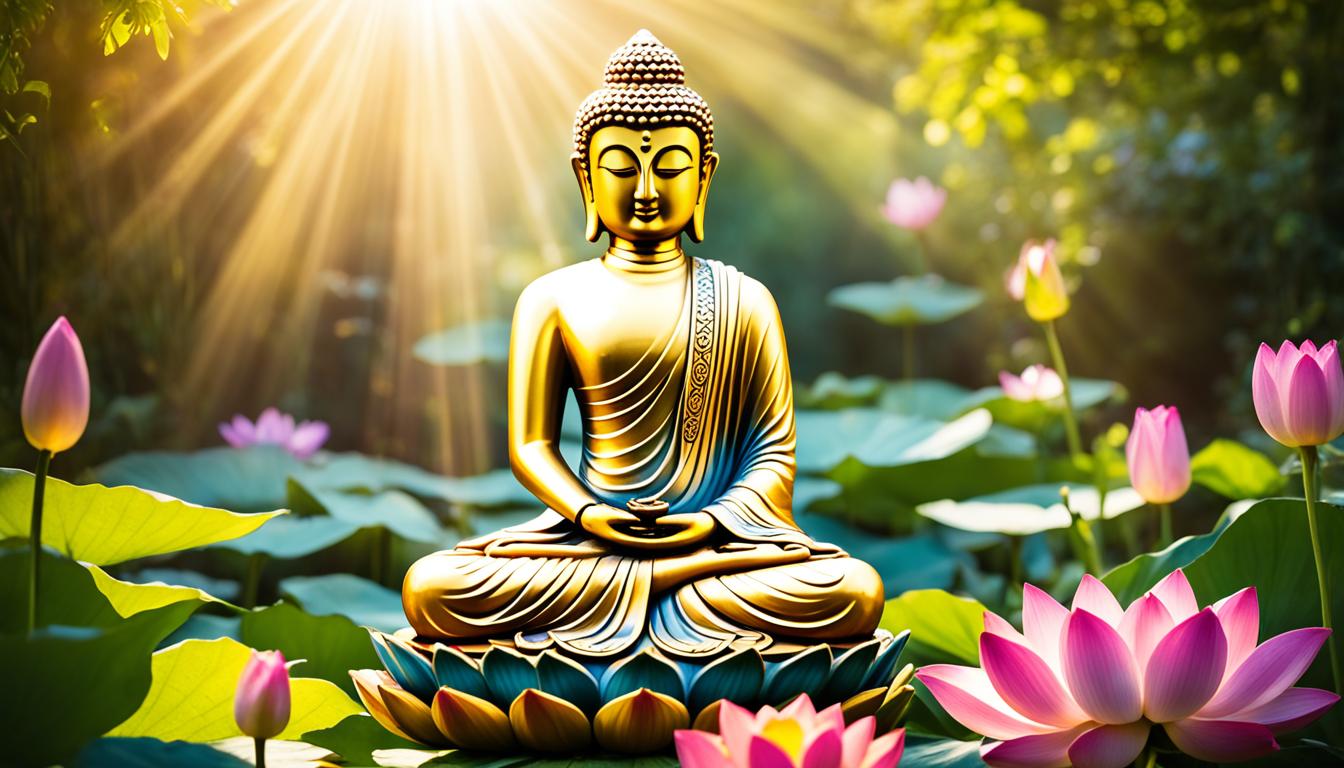Are you yearning for inner peace and clarity in your life? Do you find yourself questioning your true purpose and seeking guidance on how to live an authentic and fulfilling life? Dharma Buddhism offers profound teachings and practices that can lead you on a transformative journey towards self-discovery, liberation, and enlightenment.
Rooted in ancient wisdom and mindfulness practices, dharma Buddhism encompasses the concept of living in alignment with your true self and embracing your unique path. It teaches that by cultivating self-worth, following your heart’s desires, and savoring the present moment, you can uncover your dharma and experience a deep sense of purpose and fulfillment.
Are you ready to embark on a journey of self-discovery and spiritual growth? Join us as we explore the transformative power of dharma teachings, the cosmic order and interconnectedness of all phenomena, the path to liberation from suffering, ethical living, and the essence of dharma in Buddhism. Discover how embracing your true path with dharma Buddhism can bring harmony, balance, and inner peace into your life.
Key Takeaways:
- Dharma Buddhism offers guidance and teachings on living an authentic and purposeful life.
- Cultivating self-worth and following your heart’s desires are essential steps in embracing your dharma.
- The concept of interconnectedness and interdependence is central to dharma Buddhism.
- The Four Noble Truths and the Eightfold Path provide a transformative path to liberation from suffering.
- Ethical living, mindfulness practices, and understanding impermanence and non-self are key aspects of dharma Buddhism.
Understanding the Cosmic Order and Harmony of Dharma
In Dharma Buddhism, the concept of dharma represents the cosmic order that governs the universe. It reflects the innate rhythm and interconnectedness of all phenomena, emphasizing the interwoven nature of beings and the world we inhabit. By aligning yourself with the cosmic order, you can achieve a state of harmony and balance in your life.
Dharma encompasses the teachings of the Buddha, known as the Dhamma, which provide profound guidance for understanding the nature of existence and navigating the complexities of life. These teachings serve as a compass, guiding you on your journey towards self-discovery and enlightenment.

The Interconnectedness of All Beings and Phenomena
One of the fundamental principles of dharma is the interconnectedness and interdependence of all beings and phenomena. It recognizes that our actions and choices have far-reaching consequences, affecting not only ourselves but also the world around us. Just as a ripple in a pond spreads outwards, our thoughts, words, and actions reverberate throughout the cosmic web of existence.
This interconnectedness calls us to live with compassion, recognizing that we are all part of a greater whole. It encourages us to treat all beings with kindness and respect, knowing that every action we take has the potential to create a ripple of positive change.
The Teachings of Dharma and the Journey Within
Within the teachings of dharma, you will find wisdom that guides you towards self-realization and inner transformation. By exploring these teachings, you embark on a profound journey of self-discovery and understanding. You begin to peel away the layers of conditioning and illusion, revealing the true nature of reality and your place within it.
Through mindfulness practices such as meditation, you cultivate the ability to observe your thoughts, emotions, and sensations without judgment. This practice deepens your awareness of the interconnectedness of all things and allows you to experience the present moment fully.
By understanding the cosmic order and embracing the teachings of dharma, you can find alignment, harmony, and purpose in your life. You become an active participant in the cosmic dance, living in accordance with the interconnected nature of all existence.
| Dharma Buddhism Principles | Key Aspects |
|---|---|
| The Cosmic Order | The innate rhythm and interconnectedness of all phenomena |
| The Dhamma | The teachings of the Buddha for understanding existence |
| Interconnectedness | The interwoven nature of all beings and phenomena |
| Mindfulness Practices | Cultivating present-moment awareness and observation |
The Path to Liberation through Dharma
Dharma in Buddhism offers a transformative path to liberation from suffering. The Four Noble Truths form the foundation of dharma teachings, providing profound insights into the nature of existence and the human experience. These truths acknowledge the existence of suffering, identify its causes, proclaim its cessation, and prescribe the Eightfold Path as the way to end suffering and achieve liberation.
The Noble Eightfold Path consists of eight principles that serve as a guide for leading a virtuous and purposeful life:
- Right Understanding: Develop a deep understanding of the nature of reality and the Four Noble Truths.
- Right Intention: Cultivate wholesome thoughts, intentions, and aspirations.
- Right Speech: Choose words that are truthful, kind, and beneficial to oneself and others.
- Right Action: Engage in actions that promote mindfulness, compassion, and non-harming.
- Right Livelihood: Pursue a livelihood that aligns with ethical principles and contributes to the wellbeing of others.
- Right Effort: Cultivate the effort to develop positive qualities, let go of unwholesome habits, and maintain a balanced and harmonious mind.
- Right Mindfulness: Cultivate present-moment awareness and non-judgmental observation of the mind, body, and external phenomena.
- Right Concentration: Cultivate a calm, focused, and one-pointed mind through meditation practices.
Following the Noble Eightfold Path requires dedication, self-reflection, and continuous practice. By embracing and embodying these principles in daily life, individuals can gradually free themselves from the cycle of birth, death, and rebirth, and ultimately attain liberation from suffering.

The Noble Eightfold Path
| Principle | Description |
|---|---|
| Right Understanding | Develop a deep understanding of the nature of reality and the Four Noble Truths. |
| Right Intention | Cultivate wholesome thoughts, intentions, and aspirations. |
| Right Speech | Choose words that are truthful, kind, and beneficial to oneself and others. |
| Right Action | Engage in actions that promote mindfulness, compassion, and non-harming. |
| Right Livelihood | Pursue a livelihood that aligns with ethical principles and contributes to the wellbeing of others. |
| Right Effort | Cultivate the effort to develop positive qualities, let go of unwholesome habits, and maintain a balanced and harmonious mind. |
| Right Mindfulness | Cultivate present-moment awareness and non-judgmental observation of the mind, body, and external phenomena. |
| Right Concentration | Cultivate a calm, focused, and one-pointed mind through meditation practices. |
Ethical Living and the Principles of Dharma
In the path of dharma Buddhism, ethical living holds significant importance as it aligns individuals with the principles of Sila. Sila encompasses a set of ethical guidelines that serve as a compass for virtuous conduct and harmonious relationships. By following these principles, practitioners can navigate their actions and decisions in a compassionate and mindful manner.
The foundation of Sila lies in the Five Precepts, which guide individuals in leading a wholesome life. These precepts address the fundamental aspects of ethical living by promoting actions that foster harmony and avoid harm. The Five Precepts are:
- Refraining from harming living beings: Respecting and valuing all forms of life.
- Avoiding stealing: Practicing honesty and respecting the possessions of others.
- Abstaining from engaging in sexual misconduct: Honoring the boundaries of consent, respect, and fidelity in relationships.
- Speaking truthfully: Cultivating honesty, integrity, and transparent communication.
- Avoiding the consumption of intoxicants: Preserving clarity of mind and promoting mindfulness.
By adhering to these ethical guidelines, individuals create a foundation of integrity, compassion, and mindfulness in their lives, fostering harmony within themselves and their surroundings. However, ethical living goes beyond mere adherence to rules; it involves a deep understanding of the concept of karma and cause and effect.
Karma, a central concept in dharma Buddhism, teaches that intentional actions have consequences that shape one’s present and future experiences. It is the law of cause and effect that guides individuals on their journey of ethical living. The choices made in thought, speech, and action have far-reaching implications not only for oneself but also for the interconnected web of existence. By cultivating awareness of the impact of their actions, individuals can navigate the complexities of karma and strive to align their intentions and actions with compassion and wisdom.
Through the practice of ethical living and the understanding of karma, individuals can cultivate a sense of responsibility for their thoughts, words, and deeds. This self-awareness promotes personal growth, harmonious relationships, and the well-being of all beings. It is through living an ethical life that individuals can contribute to the harmony and welfare of the world around them, creating a ripple effect of positive change.

| Principles of Ethical Living in Dharma Buddhism | Description |
|---|---|
| Refraining from harming living beings | Valuing and respecting all forms of life, promoting compassion and non-violence. |
| Avoiding stealing | Cultivating integrity, honesty, and respect for others’ belongings. |
| Abstaining from engaging in sexual misconduct | Fostering ethical and consensual relationships based on trust, respect, and fidelity. |
| Speaking truthfully | Cultivating honesty, transparency, and authentic communication. |
| Avoiding the consumption of intoxicants | Promoting clarity of mind, mindfulness, and wise decision-making. |
Embracing the Essence of Dharma
Dharma Buddhism holds profound teachings on impermanence and non-self, inviting you to embrace these concepts as gateways to liberation and enlightenment. Impermanence, or Anicca, illuminates the transient nature of all phenomena. It teaches us that everything in life is in a constant state of change, reminding us to appreciate the present moment and let go of attachments to the impermanent. Non-self, or Anatta, challenges the notion of a fixed and unchanging self, guiding us to realize that our identities are fluid and interconnected.

Mindfulness practices play a pivotal role in dharma Buddhism, nurturing present-moment awareness and the cultivation of a non-judgmental observation of thoughts, emotions, and sensations. Through mindfulness and meditation, you can cultivate a deep understanding of impermanence and non-self, embarking on a transformative journey of self-discovery and liberation.
The Liberating Power of Impermanence
Impermanence is a fundamental principle in Buddhism, teaching us that all conditioned phenomena are subject to change. This understanding can free us from clinging to what is fleeting, releasing attachments and providing a profound shift in perspective. When we embrace impermanence, we learn to cherish and savor the present moment, knowing that it is ephemeral and precious. We let go of expectations and cravings, finding peace in the acceptance of life’s ever-changing nature.
Discovering the Illusion of Self
Non-self challenges our deeply ingrained belief in a separate, unchanging self. It invites us to investigate the nature of our identities and recognize the interdependent web of existence. By realizing that we are not separate, isolated beings, we can develop compassion, empathy, and a sense of interconnectedness with all beings. The illusion of a fixed self dissolves, paving the way for profound personal transformation and growth.
Cultivating Mindfulness for Insight and Awareness
Mindfulness practices are essential in dharma Buddhism, offering powerful tools for developing insight and awareness. Through meditation, we learn to observe the impermanent and non-self nature of our thoughts, emotions, and sensations without judgment or attachment. Mindfulness allows us to cultivate clarity, concentration, and equanimity, providing a solid foundation for the understanding of the mind and the realization of our true nature.
| Benefits of Embracing Impermanence and Non-Self | How to Cultivate Mindfulness |
|---|---|
|
|
By embracing impermanence and non-self, and cultivating mindfulness practices, you can embark on a transformative journey of self-discovery, liberation, and profound personal growth in dharma Buddhism.
Embrace Your True Path with Dharma Buddhism
Dharma Buddhism offers profound guidance and teachings for individuals seeking inner peace and enlightenment. It is a path that encourages aligning with your true purpose and living authentically. By cultivating self-worth and following your inner compass, you can embark on a transformative journey towards embracing your dharma.
One essential aspect of living your dharma is savoring the experience of being alive. It involves embracing each moment with gratitude and mindfulness, fully immersing yourself in the present. Additionally, extending love through joyful service allows you to connect with others and make a positive impact in the world.
Dharma Buddhism provides a transformative path to liberation from suffering through the Four Noble Truths and the Eightfold Path. The Four Noble Truths acknowledge the existence of suffering, identify its causes, proclaim its cessation, and prescribe the Eightfold Path as the way to end suffering. The Eightfold Path, consisting of principles like right understanding, right mindfulness, and right concentration, serves as a roadmap to finding harmony and balance in life.
Guided by ethical principles, engaging in dharma meditation, and cultivating an understanding of impermanence and non-self, you can embark on a transformative journey towards embracing your true path. By embracing dharma Buddhism, you can discover inner peace, live authentically, and find harmony and balance in your life.
FAQ
What is Dharma Buddhism?
Dharma Buddhism offers guidance and teachings that can lead individuals on a transformative journey towards inner peace and enlightenment. It encompasses the concept of living in alignment with one’s true purpose and authentic self.
What is the cosmic order in Dharma Buddhism?
Dharma in Buddhism represents the cosmic order that governs the universe. It is the innate rhythm and interconnectedness of all phenomena. Aligning oneself with the cosmic order is seen as foundational in leading a harmonious and balanced life.
How can Dharma Buddhism lead to liberation from suffering?
Dharma in Buddhism offers a transformative path to liberation from suffering through the Four Noble Truths and the Eightfold Path. Following these principles can lead to liberation from the cycle of birth, death, and rebirth.
What are the ethical guidelines in Dharma Buddhism?
Dharma in Buddhism promotes ethical living through the principles of Sila. Sila encompasses a set of ethical guidelines that guide virtuous conduct, including refraining from harming living beings, stealing, engaging in sexual misconduct, false speech, and the consumption of intoxicants.
What are the concepts of impermanence and non-self in Dharma Buddhism?
Dharma in Buddhism encompasses profound teachings on impermanence and non-self. Impermanence emphasizes the transient nature of all phenomena, while non-self challenges the concept of a permanent, unchanging self. Embracing these truths can lead to the liberation of attachments and the attainment of enlightenment.
How can I embrace my true path with Dharma Buddhism?
Embracing your true path with Dharma Buddhism involves cultivating self-worth, following your inner compass, savoring the experience of being alive, and extending love through joyful service. It also involves practicing mindfulness and meditation, and following the principles of the Noble Eightfold Path.

